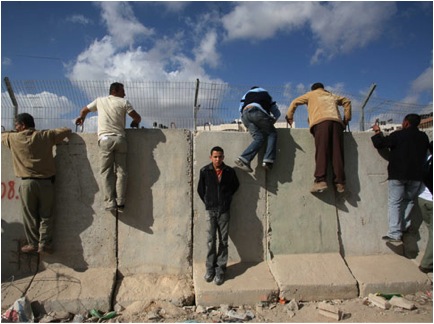The A-Word

This week, for the first time, Israel introduced Palestinian-only bus lines for its commuters from the West Bank that use public transportation. This measure, one of classic ethnic segregation, was drafted after settlers claimed that Palestinians posed a security threat on public bus routes.
The bus lines are likely to be a big topic of showcase starting next Monday, when “Israeli Apartheid Week” begins in New York City. The use of the word “apartheid” to describe Israel and its domestic policies as well as those in the Occupied West Bank and Gaza isn’t anything new, but to call it controversial or even taboo today would be an understatement.
The root problem with the word “apartheid,” in my opinion, is that it almost always conjures memories of South African apartheid, and leads to a subconscious comparison of two very different situations. Anybody who compares Israel to South Africa can find significant differences in how they treated their respective minorities, and can lead to an automatic rejection of the use of the word “apartheid” to describe Israel.
Apartheid, in the South African case, was a fully institutionalized segregation by which all public services, from healthcare to transportation, were separated by race. In Israel, many of the heavily disputed accusations of apartheid are carried out in the Occupied West Bank, a land in which the Israel Defense Forces has discretion to commit certain acts under the legal radar, particularly at checkpoints.
The other complication that arises when looking at the Israeli case is of course the issue of security; unlike South African minorities who were segregated as a racially inferior people, much of Israel’s presumed marginalization of Palestinians (like in the bus example) arise, according to Israel and its supporters, due to security. The settlements and their expansion into the West Bank, the existence of checkpoints, and the segregated roads and now buses serve as examples of where the issue of security is often given as a justification. But regardless of the reason, they are segregationist measures and so the question remains: is it reasonable to call it “apartheid?”
My first instinct, in this context, would be to find a definition of apartheid and create my own judgment from historical facts. It’s ironic that on my Apple computer, the Dashboard Dictionary brings up the first definition as “(in South Africa) a policy of segregation or discrimination on grounds of race.” I guess even for computers the word apartheid rings historical accounts.
It’s not a surprise that our governments in the Western world, then, generally frown upon the use of “apartheid” to describe Israel. Just this week, the Canadian Minister of Citizenship, Immigration, and Multiculturalism, Jason Kenney, called Israeli Apartheid Week “a misleading attempt to delegitimize and demonize the only true liberal democracy in the Middle-East.” He called the activities performed during that week “vitriol[ic]” and “toxic.”
And this, in my opinion, is where critics of IAW lose me: are we actually condemning the events and the people that organize IAW, or do we just viscerally disapprove of the word “apartheid” to describe Israel? If the issues of mass incarceration, settlements, and segregated bus lines were discussed and protested next week (and indeed they will be) under the banner of a week called “Israeli Criticism Week” or “Israeli Censure Week,” would these reactions be any less vitriolic themselves?
Using a definition and making a personal analysis seems simple enough, but I’m fully convinced that the Canadian government, and many other critics of IAW I suspect, have not done this. Although the first paragraph of his statement published on March 4 addressed the week in general and its “reckless” activities, the rest of Kenney’s exposé was about criticizing Israel in general and manipulating the meaning of academic freedom, rather than using targeted examples and factual grounds to denounce the week.
So who’s at fault? Is society wrong for interpreting the word “apartheid” as inflammatory, or are IAW organizers (regardless of how correct the word might be in this context) just turning away more heads from their cause?
There is, subsequently, an underlying problem with the dictionary model as well; critics of Israel in all shapes and sizes oftentimes find themselves labeled as anti-Semites or subjected to severe social censures. This suggests that a criticism of Israel, whether under the banner of apartheid or any other word, will be inherently intolerant or hateful. I say this from experience as a Columbia student and columnist for the Columbia Political Review, but I can draw yet another example from Minister Kenney’s statement: after his extended reprimand, he ended the statement with the sentence “I encourage Canadians to speak out against all forms of discrimination, intolerance and anti-Semitism.” I interpret this as a direct, if not only implied, suggestion that IAW is inherently anti-Semitic. The problems with this are numerous, the least of which being the contradiction that many Jews participate in Israeli Apartheid Week in several capacities.
It concerns me that discourse over Israeli Apartheid Week isn’t often, in summary, based on apartheid as it should be. Our lawmakers and peers have influence, and a more-or-less confused condemnation of IAW like the one made this week by my government, the Canadian government, does little to improve the conversation we should be having. Maybe the government would do well to pick up a dictionary, but maybe the masterminds behind IAW would also do better to pass on the A-word to provide an easier route to the dialogue we desperately need. To a Palestinian, though, it’s just another day on a segregated bus between Israel and its occupied neighbour.
